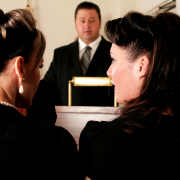6 of the Worst Things to Say at a Funeral
 Death is an unpleasant inevitability of life. Its presence is the most damning, most uncomfortable thing in this world. That’s why even the most talkative of all people fall short on what to say (or what not to say) during a funeral. However, sometimes, things get a little awkward especially when someone in the room blurts out something that is far from appropriate.
Death is an unpleasant inevitability of life. Its presence is the most damning, most uncomfortable thing in this world. That’s why even the most talkative of all people fall short on what to say (or what not to say) during a funeral. However, sometimes, things get a little awkward especially when someone in the room blurts out something that is far from appropriate.
There is no standard way to grieve. However, there is an unspoken funeral etiquette we all must take note of. So if you don’t want to become the most hated person in the room, these are the worst things to say at a funeral.
- “I know how you feel”
Yes, you mean well by saying that. However, the truth is you don’t know how the person feels. You don’t know what they’re going through, what they’re thinking or what’s going on inside of them. This sounds like an absolute statement, which isn’t exactly the most emphatic of all.
The better way to approach this is to keep an open-ended statement. Use the phrase “I’m here if you need anything,” after relaying your personal experience.
- “Be strong”
Again, we mean well when we say this. We want the grieving person to keep their sanity intact but you could be doing more harm than good when you say this. Telling someone to “be strong” negates them on how they want to feel. If they feel like breaking down, let them. Allow them to express exactly how they feel, strong or not.
Let yourself or the person to respond emotionally, instead of cognitively. This way, they get in touch with their emotions instead of blocking them.
- “She’s in a better place now”
We all like to think that the departed has finally found his/her peace once they pass on from this world. However, telling someone that the person is in a much better place now tells them that they weren’t supposed to be in this world. Remember that the grieving believes that the best place for the departed person to be is right at their side.
Instead of blurting out this statement, offer a story of memory about the person. Share what you will miss about his or her and let the rest proceed with their own grieving.
- “He looks so natural”
This has to be one of the most inappropriate things to say when you’re at a funeral. Very Well writes, “Have you ever looked at a living person and said something like this? Of course not, because someone who looks natural in life just looks, well… natural. In other words, we don’t feel the need to comment on it. Uttering this comment when looking at a dead human being lying in a casket, however, merely emphasizes that he or she is not alive.”
Simply readily agree with the grieving person says, “Doesn’t he look wonderful?” Also keep in mind that you need to avoid making any comments about how the departed was embalmed or made up. It’s simply an insensitive statement that shouldn’t be said at any time.
- “He wouldn’t want us crying”
Again, you are voiding people of how they want to feel. When you say this to someone, you’re dictating how s/he should feel. This will only leave the person even more helpless or hurt.
Each of us has our own way of grieving. Let everyone exercise how they want to mourn the death of their beloved. Allow them to cry as much as they want to because we all have our own ways of coping with death.
- “We are not here to mourn _____’s death but to celebrate his/her life”
Chad Bird of Patheos perfectly exemplifies this common misconception in his blog post, saying: “So-called “Celebrations of Life” (which I have written against in “The Tragic Death of the Funeral”) do a disservice to the mourners for they deny or euphemize death. The gift of life cannot fully be embraced if we disregard the reality of death, along with sin, its ultimate cause. Whatever the apparent reason for my decease may be—a sickness, accident, or old age—the real reason is because I was conceived and born in sin, and I built atop that sinful nature a mountain’s worth of actual sins. The only person’s life to celebrate at a funeral is the Savior conceived of the virgin Mary, who became our sin on the cursed tree that we might become His righteousness in the blessed font, who buried sin and death in the empty tomb He left behind on Easter morning.”
This is not to withhold meaning from the departed’s life. This only means understanding that there is Higher Power in death and eternal life.









